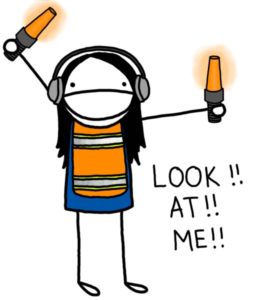We all know what bragging is. We’ve all done it, and we’ve all been on the receiving end of it. But what is bragging? And when is it ok (bragging-ok) to do it? And when is it not ok?
What are the consequences of bragging – both good and bad? To answer these questions, we turned to experts in the field. Read on to learn everything you need to know about bragging!
Contents
Understanding Bragging

Bragging is the act of praising oneself or one’s achievements, possessions, or qualities to others. It can be done verbally or through social media. Bragging is often seen as a negative behavior, but it can also be viewed in a positive light.
Why People Brag
There are many reasons people brag. One possible reason is to increase social status in a group or community by boasting about their achievements and possessions. It’s also possible that they’re trying to feel better about themselves when they have low self-esteem. But it doesn’t work because others see them as arrogant and conceited instead of confident and secure with themselves.
Another reason why people brag is to embellish their accomplishments, possessions, or qualities to gain more attention from others who may be impressed by what they’ve done or own and want those things for themselves too! People also brag because it makes them feel good about their achievements and gives them an ego boost when someone else praises them.
Why Bragging Is Important
There are many benefits to bragging, but one of the most important is that it helps us feel good about ourselves. When we brag and get positive feedback from others, our self-esteem increases which makes us happier overall!
It’s also important for people to know how accomplished you are so they don’t underestimate your abilities or skills. This can come in handy when you’re looking for a job, networking, or trying to get ahead in your career.
Bragging Vs. Self-confidence
There’s a big difference between bragging and having self-confidence. People who have high self-esteem are secure in themselves and don’t feel the need to brag about their accomplishments. They know they’re good at what they do, but they’re not arrogant or cocky about it.
When Bragging Is Rude
When bragging becomes excessive and is done in a way that’s considered rude, it can have negative consequences. For example, if you’re constantly talking about yourself and your accomplishments to the point where others are tuning you out or feeling uncomfortable, then you’re doing it wrong!
Bragging can also be viewed as arrogant and self-centered when someone is always putting themselves above others and looking for validation from others. This is not a good look, and it can make people dislike you or even be scared of you.
Types of Bragging
There are different types of bragging, and it can vary depending on the person’s motive for doing it. Here are some common types of bragging:
Praise-seeking bragging: This type of bragging is done in an attempt to garner admiration from others. The bragger wants others to see them as impressive and desired.
Inflated bragging: This type of bragging is done when the bragger exaggerates their accomplishments, possessions, or qualities to make themselves look better than they are.
Comparative bragging: This type of bragging is done when someone compares themselves to others, whether it’s good or bad. They’ll say things like “I’m better than you” or “You’re worse off than me.”
Defensive bragging: This type of bragging is often seen as a way for people with low self-esteem to build up their confidence. They may brag about their achievements and possessions because they don’t believe in themselves or feel like no one else does either.
Personality Types Prone to Bragging
Some people are just more likely than others to brag. Here are some personality types prone to bragging:
Narcissists: They’re so full of themselves that it’s hard for them not to brag about their achievements and possessions. It makes them feel good when someone compliments them, so they’ll do anything for attention even if it means being boastful.
Extroverts: They love having conversations with other people and will brag about their accomplishments because it’s a way of connecting with others through shared experiences.
Insecure people: Bragging is one way to make up for low self-esteem or confidence. It makes them feel better about themselves when someone else praises them and compliments their achievements or possessions.
Evaluating Bragging

We all brag from time to time, but there are times that it’s not appropriate. Here are some guidelines for evaluating your bragging behavior so that you can be more mindful of when it’s appropriate and when it’s not:
When It Is OK To Brag
It is ok to brag if the following conditions are met:
You’re sharing good news: If you’ve had a great accomplishment or something positive has happened to you, it’s ok to share that with others. Just be sure not to brag in a way that makes others feel bad or diminishes their accomplishments.
The bragging is justified: If you have evidence to back up your claims, then it’s ok to brag about them. For example, if you won the lottery, it’s ok to tell people because you legitimately won and there’s no need to embellish your story.
You’re complimenting someone else: It’s always nice to give a compliment, and in some cases, it can be seen as bragging if you do it in a way that makes the other person feel good. Just be sure not to overdo it or make it seem like you’re trying too hard.
When It Is Not OK To Brag
There are times when it is not ok to brag, and these include:
You’re bragging about something bad: If you’ve done something terrible or you’re in a bad situation, it’s not ok to brag about it. It’s probably best to keep quiet altogether.
The bragging is excessive: If you’re talking non-stop about how great you are and your accomplishments, it can be seen as annoying or even arrogant. People don’t want to hear about your great life all the time, so save it for special occasions.
The bragging is unoriginal: If you’re just copying what others have said or if your claims can’t be backed up, then it’s not ok to brag. It makes you look like a liar or someone who isn’t very creative.
You’re making fun of someone: It’s never ok to make fun of someone else, especially if you’re doing it in a way that makes them feel bad. Bragging can sometimes cross the line into bullying, so be sure not to do it.
Exploring Bragging In Different Contexts

We all brag from time to time, but there are times when it’s not appropriate. Here are some examples of bragging in different contexts:
At work: It’s ok to talk about your accomplishments at work because you want people to know how great you’re doing. Just be sure not to overdo it or make others feel bad.
In social situations: It’s ok to talk about your accomplishments in social situations, but be sure to share the glory with others. Nobody wants to hear a one-sided conversation where you’re doing all the bragging.
With friends: It’s always ok to brag about your friendship with celebrities or other famous people. Just be sure not to brag about them in a way that makes your friends feel bad.
On social media: It’s ok to post about your accomplishments on social media, but be sure to keep it classy. Don’t use hashtags like #bootylicious or #ballin’ because they make you look like a jerk.
Hearing from Experts
When it comes to bragging, some experts can offer more insight. Here’s what they have to say:
“Bragging is a way of getting attention and feeling good about oneself. It can also be a way of building relationships by showing off what we have or what we can do. However, bragging can also backfire. If it is excessive or if the listener doesn’t believe the bragger, the listener may end up feeling bad about themselves.”
-Dr. Ana Nogales
Case Study
In some cases, bragging-ok can go wrong. Here’s an example from the real world:
In Relationship
“I used to brag about my girlfriend all the time. She was beautiful, smart, and successful. I was so proud of her that I would tell everyone how great she was – it felt like bragging because it made me feel good about myself. But then one day, she left me for another guy who had more money than me.”
-Tom, 32
In this case, Tom’s bragging caused him to lose the love of his life. He was so focused on making himself look good that he didn’t bother to learn about his girlfriend’s interests or what made her happy. In the end, it backfired and he lost out on a great relationship.
In Parenting
“I was so proud of my son when he got into college. I bragged to all my friends and family about how smart he is. But then I found out that he was failing his classes and wasn’t doing well at all. I feel like such an idiot now.”
-Susan, 46
In this case, Susan’s bragging caused her to have unrealistic expectations for her son. She put so much pressure on him to succeed that it caused him to fail. Now she regrets bragging about him so much and wishes she had been more supportive instead.
In Workplace
“I was talking to my boss about a project I had worked on and I couldn’t help but brag about how great it turned out. But then she told me that someone else had also worked on the project and they did a better job than me. I felt like such an idiot.”
-Natalie, 25
In this case, Natalie’s bragging caused her to look bad in front of her boss. She was so focused on making herself look good that she didn’t bother to learn about the other person’s contributions. This made her look like a terrible employee and it cost her a potential raise.
In Society
“I was talking to a friend about my new car and I couldn’t help but brag about how great it looked. But then he told me that his car is better because it has more horsepower than mine does.”
-Paul, 30
In this case, Paul’s bragging caused him to look bad in front of his friend. He was so focused on making himself look good that he didn’t bother to learn about the other person’s interests. This made him look like a terrible friend.
On Social Media
“I was at a party and I saw this hot girl. I started posting about how amazing she was on my social media accounts. But then she didn’t text me back. I realized that I had been too obvious and it made me look like a jerk.”
-Alex, 25
In this case, Alex’s bragging caused him to look bad on social media. He was so focused on making himself look good that he didn’t bother to learn about the other person’s interest or what they were looking for in a potential date. This made him come across as desperate and it cost him a chance at romance.
NOTE: After reading all these examples, it’s clear that bragging can go wrong. It can make you look bad and even cost you a promotion or relationship if done incorrectly.
Doing Bragging In Classy Way

Bragging-ok can be a tricky thing – it can make you look bad if done incorrectly. But if done in a classy way, it can make you look good and even get you a promotion or date. So, how do you brag without looking like an idiot? Here are some tips:
Be aware of the other person’s interests: Make sure that what you’re bragging about is something that the other person cares about or else it will all fall flat.
Don’t talk about yourself too much: If people always hear about your accomplishments, they’ll start to tune it out. Share information that is relevant to the conversation and saves the bragging for special occasions.
Make sure your claims are verifiable: Back up your statements with evidence or examples to make them more believable.
Don’t be too obvious: Subtlety is key when bragging. If you come across as desperate, you’ll only embarrass yourself.
Job Interview Tips
Here are some tips on how to brag in a job interview:
Be confident: It’s okay to show some confidence when talking about yourself, but don’t be too cocky because that will turn off the interviewer.
Talk about your accomplishments and skills: Don’t be too boastful, but make sure that they know what you’ve accomplished.
Stay humble: No one likes a braggart, so make sure you stay humble while talking about your achievements.
Make sure your claims are verifiable: If you say that you’re an expert in Excel, be prepared to answer questions about it.
Be aware of the other person’s interests: Make sure that what you’re bragging about is something that the interviewer cares about.
Don’t talk too much: Let the interviewer do most of the talking and save your bragging for the end.
Make it relevant: Only talk about things that are relevant to the job you’re interviewing for. Don’t go on and on about how great you were at your last job or what a good student you were in college.
Dealing With Bragger
If you encounter someone who is bragging, there are a few things you can do:
Listen and show interest: The best way to handle a bragger is to listen attentively and not give them too much attention. Because that’s what they’re seeking. This will make them feel validated and important, so they might calm down after a while.
Challenge their assumptions: If the bragger is making claims that can’t be verified, you can challenge their assumptions by asking for proof or examples. This will make them think twice about what they’re saying and it could even shut them down.
Make fun of them: Another way to deal with a bragger is to make fun of them. This will put them in their place and it might even embarrass them. Just be careful not to go too far or you could end up in a fight.
Conclusion
Don’t take yourself too seriously – It’s okay to brag sometimes, but don’t make a habit of it. If done correctly and in moderation, bragging can be a useful tool for getting ahead at work or finding dates on social media. Just make sure that you’re always aware of the other person’s interests and don’t come across as a jerk. Thanks for reading!
A Word From Therapy Mantra
Your mental health — Your psychological, emotional, and social well-being — has an impact on every aspect of your life. Positive mental health essentially allows you to effectively deal with life’s everyday challenges.
At TherapyMantra, we have a team of therapists who provide affordable online therapy to assist you with issues such as depression, anxiety, stress, workplace Issues, addiction, relationship, OCD, LGBTQ, and PTSD. You can book a free therapy or download our free Android or iOS app.


